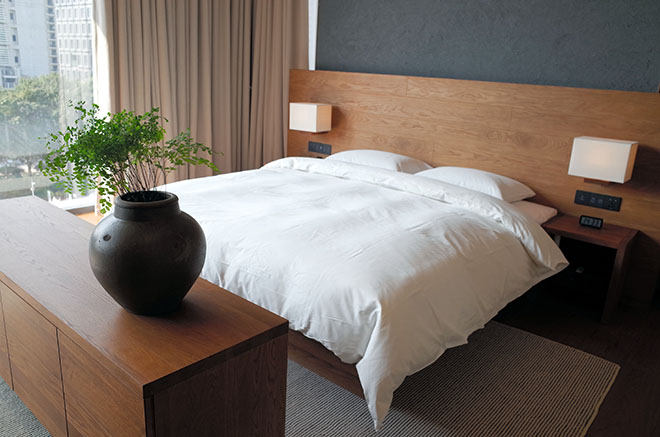First Muji Hotel opens in China as Japanese brand expands
Source:asahi
Muji is planning to open more branches, mainly in Asian cities.
A guest room in the world's first Muji Hotel, which opened in Shenzhen, China, in January (Naoyuki Fukuda)
Retail brand Muji has branched out into the hospitality industry with its first hotel, designed in its signature minimal style, in this coastal city within spitting distance of Hong Kong, China.
The opening showcases the first results of an idea Muji operator Ryohin Keikaku Co. has been exploring since 2002. A Shenzhen-based hotel operator collaborated on the project, and the first franchise was opened within a shopping mall in Shenzhen’s Futian district on Jan. 18.
The hotel, billed as a “facility where guests can experience Muji’s view of the world,” offers the same styles of bedding, toiletries and bathroom amenities as those available at Muji stores. Items popular in Japan such as wall-mounted CD players and toothbrush stands are included as fixtures of guest rooms.
“The younger generations in China have started to appreciate simplicity precisely because they grew up in affluence,” said Ryohin Keikaku's president, Satoru Matsuzaki.
Explaining Muji's popularity in China, Matsuzaki told The Asahi Shimbun, “To begin with, there is a mentality that is rooted in the philosophy of Laozi and Zhuangzi that values simplicity.”
Cleaners at the hotel wear the same border shirts on sale in Muji shops, and receptionists’ uniforms are also sourced from the brand’s range.
The fittings and interior designs of the 79 guest rooms have utilized natural material themes such as “earth” and “wood,” in keeping with Muji products. The walls of each room are plastered with earth, a traditional material used in Japanese architecture.
The earthen plaster of the dark wall behind the headboard is mixed with rice straw and charcoal, known for its high deodorizing property.
Rooms are decorated with off-cuts of furniture collected from factories in China, and the wall behind the reception is decorated with recycled materials.
Some guest rooms have views of an old wooden fishing boat placed in the courtyard, which was acquired from a nearby village. The boat symbolizes old Shenzhen, which rapidly expanded from a tiny fishing village into a bustling city.
Naturally, the hotel also contains a Muji shop, which boasts floor space of 1,726 square meters, making it the third-biggest Muji store in China.
Also on site is a Muji Diner, China’s second, after the original outlet in Shanghai.
Chinese customers are not the only ones excited by the Muji Hotel development, which has built a global following via its Instagram account.
The hotel started taking bookings from Jan. 10, and more than 500 rooms were booked before its official opening.
“Guests can have the full Muji experience, through shopping, dining and staying overnight,” said Matsuzaki. “I believe it can turn them into more enthusiastic fans of Muji, far more than just being shoppers at Muji outlets are able to.”
A one-night stay at Muji Hotel Shenzhen is priced from 950 yuan (16,000 yen, or $150).
The second Muji Hotel is due to open in Beijing this spring, and the third one is expected to throw open its doors in Tokyo’s upscale Ginza district in spring 2019. The company is planning to open more branches, mainly in Asian cities.
(Source:asahi.com)
-

"2021 China Internet Home Improvement Consumption Trend White Paper" released
-

Sales of soft furniture such as sofas and beds in China doubled in August
-

China' s furniture retail sales in August was 13.7 billion yuan, a year-on-year increase of 6.7%
-

From January to August, China' s furniture exports reached 305.43 billion yuan, an increase of 31%


 沪公网安备31010402003309号
沪公网安备31010402003309号



